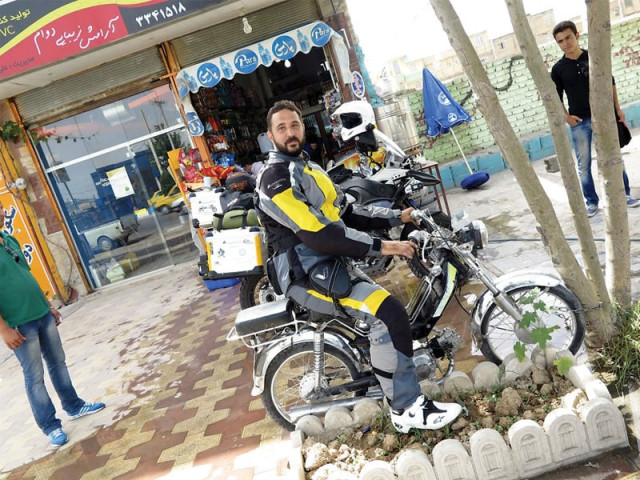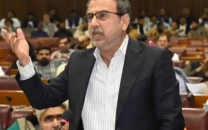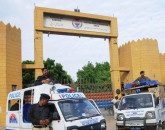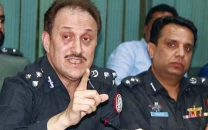One man mission
Jayyousi is driven to ride across 22 countries to raise funds for a paediatric cancer centre in Palestine.

“It was the most intense experience I have ever had,” says 37-year-old Wissam who is travelling on a Jordanian visa. “It was as if no one communicated with anyone else and everyone worked separately,” he says about the bureaucrats and law-enforcement personnel he had to go through.
On May 17, five days after he started his Silk Road Journey from Dubai where he works as an IT consultant, Wissam entered Balochistan through the Taftan border via the Iranian border town of Mirjava. After 40 stops, he made his way to Quetta, from where he was to ride over to Lahore and finally end up at the Wagah border so that he could enter India. But in his 11 days in Pakistan, Wissam ended up interacting with more officials than an average Pakistani has to in a year as he crossed one security check-post after another to make his way from Balochistan to Punjab.
“Outside Quetta, an assistant commissioner told me that I was the first tourist to have come to Balochistan in eight years,” Wissam says. And that certainly appeared to be the case, given the confusion and red tape that he had to wade through in order to continue with his time-bound journey, which was not only delayed but “turned into a nightmare” by what appeared to be contrived complications created by inefficient bureaucrats.
“I was told that I would be given an escort for security. And I didn’t have a problem with that although security is an issue because one cannot keep a low profile with that,” says Wissam. “At every check-post you have to wait 45 minutes for security support.”
The time Wissam spent waiting weighed heavily on him. This isn’t a ride for personal thrill or kicks — far from it, considering the rib injuries he survived on the way — it is, in fact, a project on which many lives depended. “The trip I am on right now is to build a cancer hospital for children in a city called Beit Jala in the West Bank,” Wissam explains. “Because of the types of bombs that have been used in Palestine, cases of cancer, especially in children, have increased and there’s not a single paediatric cancer centre in Palestine.”
For this trip, Wissam has collaborated with the Palestine Children’s Relief Fund (PCRF), a non-profit organisation which was established in 1991 by an American man who lost his Palestinian wife to cancer.
This may not be Wissam’s first such initiative, but it is certainly his toughest. Founder of an organisation named Goodwill Journey, which brings together individuals who use adventure to bring about positive global change, Wissam completed his first trip in 2010, in which he biked from Dubai across 36 countries in 60 days to finally arrive in London. According to goodwilljourney.org, his organisation’s official website, the trip’s goal was to help children with special needs in Gaza and was a collaboration with Hope and Play, a British charity organisation focused on helping Palestinian children. Given that he managed to raise $120,000, that’s one project he can safely put in the ‘win’ column.
“What I do is I find an NGO that has a project but doesn’t have the funds for it. It just has to be an NGO that does not have any religious or political connections,” says Wissam when asked about his selection criteria.
On the Silk Road Journey, the target is to raise half a million dollars, of which more than $180,000 have been collected even though Wissam has only completed a fourth of his journey, battling as he does with diversions caused by bureaucratic tussles and concerns for his security.
“I was taken out of the [Taftan] border by a pickup van with a gunman that followed me for two kilometres. Then I went for 300 kilometres non-stop. And that is where I was stopped at another check-post,” he says. At this checkpoint, Wissam was told to go back to the city to get a no-objection certificate from the federal interior ministry that would allow him to cross the Balochistan-Punjab border and travel without any “hurdles”. Although he was running out of time — his motorbike’s battery died at Sanjawi, 300 kilometres outside of Quetta, and the Balochistan Levies had to tow the injured biker and his vehicle — Wissam patiently made that detour to obtain the permit, believing it would only make his journey easier.
That’s not what the official at the Dera Ghazi Khan border thought, who found a reason so frivolous to demand another NOC that this became Wissam’s most memorable memory from his Pakistan trip. “I will never forget the face of that officer Habibullah, who looked at the NOC and said that the document says DG Khan but not DG Khan, Punjab, and then refused me entry into the province,” Wissam says, almost disbelievingly.
By now, he was almost 11 days into his trip — his eighth day in Pakistan — and needed to speed up his progress to stay on track and enter India at the designated date. Without much of a choice, Wissam trudged back to Zhob but refused to leave for another city in the province when he was told his permit missed other equally negligible details. The officials refused to budge, but so did Wissam who decided to go on a four-day hunger strike. “Honestly, I thought nobody cared. So, I stopped eating and drinking,” he says.
While one set of Pakistanis made life as tough for him as they could, another set spurred into motion, and their hospitality and unswerving support brings tears to Wissam’s eyes. “Extremely nice people, I have never seen such nice people. Seriously,” he says of everyone who called and supported him, just when he though nobody was bothered.
Sophia Ahmed and Zohare Haider were the two Pakistanis at the forefront of the #FreeWissam and #HelpWissam Twitter campaign that eventually enabled him to continue with his journey.
“Twitter was the main medium that started moving people here in Dubai and Pakistan. I got about 200 odd retweets and interactions in a single day,” says Sophia, a UAE-based Pakistani chartered accountant, who went into a “tweeting frenzy” when Wissam’s wife Gorana Veselinovic reached out to her. A supporter of the PCRF, Sophia had known about Goodwill Journey’s initiative and tried to connect Wissam with a support network in Pakistan when he was heading out for the journey. “In the end, it worked out well!” she says.
On the ground in Pakistan, Zohare, an ex-colleague of Sophia, was in touch with her regarding Wissam’s visit and was instrumental in ensuring that Wissam reaches Lahore in time to get to Wagah.
Following the Twitter campaign, Wissam’s supporters in Pakistan and the UAE started calling up officials and anyone who could do anything to get him out of there. As his cell phone’s battery had well and truly run out of charge, they started calling him on his satellite phone, extending all kinds of support to the stranded biker. “It is just amazing how everybody comes together. I started getting phone calls from people I have never heard of, I don’t know who they are. [From] Lahore, Islamabad, Peshawar, Pakistanis in Dubai.”
By May 25, 13 days into his journey, he was flown in to Peshawar. “It was like moving from a continent to a continent. Just moving across that line,” he says, of the process of moving to Khyber-Pakhtunkhwa to Balochistan.
The same day his bike was sent to Lahore where Pakistani biker Moin Khan began fixing it. Last year, Moin had embarked on a similar project called A Different Agenda and rode his bike from San Francisco to Pakistan. “The situation in the country is not safe for foreigners to come and bike freely but Pakistan’s terrain is a biker’s heaven,” says Moin.
When Wissam landed in Peshawar, two friends of Zohare received him and took him for a meal to end his hunger strike. Pressed for time, Zohare and his friend Romano Kareem drove from Islamabad to Peshawar to pick up Wissam so that he wouldn’t have to wait further for his departure to Lahore. The next day, he was in Lahore to work on his bike with Moin and left for Wagah on May 28.
Extremely grateful to Zohare and his friends, Wissam says they do not need to apologise for what he had to endure in Balochistan. But they do feel responsible, at least in part, for Wissam’s suffering.
“This is our country and we had to rectify the situation and do whatever we could to offer support to Wissam. This was our job. Who else would do it?” insists Zohare.
That line of reasoning resonates with Wissam, who has taken it upon himself to go around the world, determined not to let anyone forget the suffering of his country and at the same time countering the stereotypical view of Palestine that it is “just a place where people get bombed or blow themselves up.” Born during the conflict, Wissam recalls how his parents talked about Palestine once they migrated from there. “We were raised in an environment where we were told how to donate and that Palestine is our country, because if parents stop doing that [teaching their children], Palestine is lost forever,” he says.
Although he couldn’t return to Palestine, Wissam kept finding ways to help Palestinians. He first started with mountain-climbing and carefully chose the 7,161-foot-tall Nepalese mountain Pumori, which means “unmarried daughter”, for a project he called Our Daughters of Palestine. “The conflict has led to immense poverty, and once the men in the family are either injured or killed, one of the first things to be removed from the priority list of war-torn households is the higher education of women,” Wissam says. Through the project, he succeeded in collecting enough money to completely fund the academic expenses of 14 young Palestinian women.
But, Wissam felt, mountain climbing was limited in terms of outreach and something more needed to be done to create greater global awareness. That is when he decided to combine his two passions, Palestine and biking, and create sound waves that would make every head turn as he whirred past. But apart from the fact that a lot more noise needs to be made to garner enough attention to the plight of Palestinian men, women and children, it was also a more practical tactic, he says. “It is easier to move on a motorbike. Bikes are much lighter and the message delivered is much louder,” says Wissam, who has been an avid biker for 14 years.
Despite his earlier experience, Wissam is now back in Pakistan after biking through India, Nepal and Bhutan. “I made many friends when I was here last time, and they were waiting for me. So it was like going back home honestly,” he says, cheerfully, even though it is 3am and he is a few pounds lighter than he was during his first Pakistan trip.
His next destination is Afghanistan, which he hopes to enter through the Torkham Border, from where he will go on to Uzbekistan. “Something that happens and keeps me going [is that] children in Palestine keep sending me pictures with boards saying thank you. I mean that is more than enough for me to keep going.”
The journey is tough but Wissam is tougher. “Palestinians go through this every day on different levels, from being denied visas, education, medical assistance, support, food and water, denied from the basic forms of life and here I am complaining because I was denied a visa,” Wissam had written on his blog, before he started the journey and was being refused visas right, left and centre. And with the Palestinians’ plight far from over, Wissam has plenty of reason to continue on with his journey until he reaches Singapore, his final destination.
Published in The Express Tribune, Sunday Magazine, June 24th, 2012.


















COMMENTS
Comments are moderated and generally will be posted if they are on-topic and not abusive.
For more information, please see our Comments FAQ